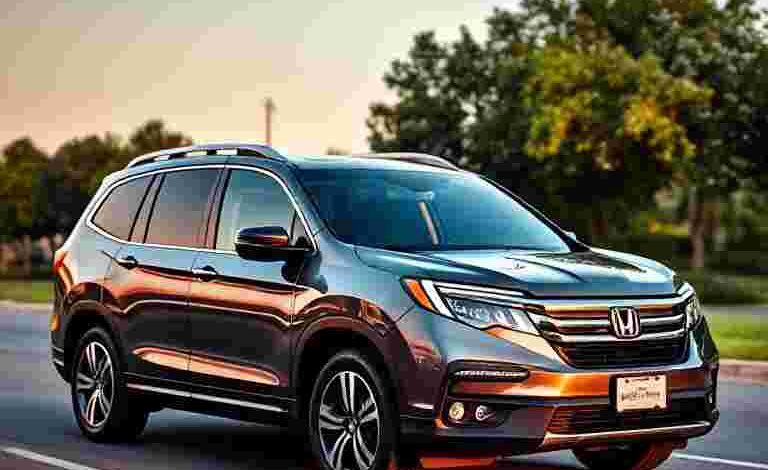Unlocking Business Potential with a Used Honda Pilot: A Smart Move for Entrepreneurs

In today’s fast-paced business world, having reliable transportation isn’t just about getting from point A to B—it’s about efficiency, cost-saving, and projecting a professional image. If you’re a small business owner, entrepreneur, or even a fleet manager looking to optimize your operations, investing in a used Honda Pilot might just be the smartest decision you’ve made all year. This midsize SUV has built a reputation for durability, comfort, and versatility—traits that can significantly benefit your business endeavors.
In this comprehensive guide, we’ll explore why a used Honda Pilot stands out in the crowded marketplace of used vehicles, especially for business applications. From assessing its value to understanding how it can serve your specific needs, we’ll cover everything you need to make an informed decision that aligns with your business goals.
Why a Used Honda Pilot Is a Game-Changer for Business Owners
The Honda Pilot has been a staple in the SUV segment for over a decade, consistently earning praise for its dependability and family-friendly features. Nowadays, more business owners are recognizing its potential as a fleet vehicle, especially when purchased used. Why? Because it strikes a perfect balance between affordability and performance, making it a compelling choice for entrepreneurs who need a vehicle capable of handling daily tasks and occasional heavy-duty work.
Reliability That Keeps Your Business Moving
One of the biggest concerns for business vehicles is reliability—downtime costs money. The used Honda Pilot is renowned for its longevity, with many models surpassing 200,000 miles with proper maintenance. Honda’s engineering excellence ensures that these SUVs are built to last, even under the rigors of daily business use.
Furthermore, Honda’s extensive service network makes maintenance straightforward and affordable. This means fewer unexpected repairs and more predictable expenses, which is crucial for small business budgeting. When you invest in a used Pilot, you’re not just buying a vehicle; you’re securing a dependable partner that minimizes operational disruptions.
Versatility for Business Needs
The Pilot’s spacious interior and flexible seating arrangements make it ideal for various business applications. Whether you need to transport employees, deliver goods, or carry bulky equipment, the Pilot adapts seamlessly. The latest models feature a generous cargo space, fold-flat seats, and advanced storage options, allowing you to customize the vehicle according to your specific needs.
Additionally, many used Honda Pilots come with modern tech features—navigation systems, Bluetooth connectivity, and rearview cameras—that increase efficiency and safety on the road. These features help your team stay connected and avoid delays or mishaps, ultimately boosting productivity.
Cost-Effectiveness and Resale Value
Buying a used Honda Pilot offers significant cost savings compared to new vehicles. Not only do you avoid depreciation costs that hit new cars hardest, but you also get access to a vehicle that still maintains strong resale value. Honda’s reputation for durability means your used Pilot can retain its worth longer, providing you with an asset that can be liquidated or traded-in when your business needs evolve.
Moreover, with a wide market of used Pilots available, you can find models that fit your budget without sacrificing essential features. This affordability allows small businesses to allocate funds toward other growth initiatives—like marketing, inventory, or staffing.
What to Look for When Buying a Used Honda Pilot for Your Business
Before you rush into a purchase, it’s essential to do your homework. Not all used Honda Pilots are created equal, and some might require more maintenance than others. Here’s a practical checklist to help you identify the best fit for your business.
Model Year and Mileage
While Honda Pilots are known for longevity, newer models generally come with updated safety features, tech, and fuel efficiency. For 2025, the latest available used models range from 2018 to 2022. A vehicle with lower miles—ideally under 100,000—is preferable for longer-term reliability.
Service and Maintenance History
Request detailed maintenance records to ensure the vehicle has been properly cared for. Regular oil changes, brake replacements, and safety inspections are signs of a well-maintained vehicle. Avoid models with a history of major repairs or accident damage, which could lead to unforeseen costs.
Inspection and Test Drive
Always conduct a thorough inspection, preferably with a trusted mechanic familiar with Honda vehicles. Pay attention to engine performance, transmission smoothness, brake response, and suspension integrity. A test drive can reveal issues with steering, acceleration, or unusual noises—red flags that warrant further investigation.
Features and Specifications
Depending on your business needs, prioritize models with features like all-wheel drive, advanced safety systems, or cargo management solutions. The 2020 and newer models often include Honda Sensing, a suite of driver assistance features that can enhance safety during daily operations.
Making the Most of Your Used Honda Pilot Investment
Once you’ve identified the right vehicle, it’s time to maximize its value for your business. Here are some strategic tips to ensure your used Honda Pilot serves your company effectively:
Customization for Business Use
Consider modifications that improve functionality—such as roof racks for equipment, cargo organizers, or branding wraps. These enhancements can turn your Pilot into a mobile billboard while increasing practicality.
Regular Maintenance and Upkeep
Stick to a routine maintenance schedule. Regular oil changes, tire rotations, and brake inspections are vital to keep your Pilot running smoothly. Preventive care minimizes costly repairs and extends the vehicle’s lifespan.
Utilization Tracking
Monitor how your vehicle is used—fuel consumption, mileage, and service needs. This data helps optimize routes, improve efficiency, and plan future vehicle purchases or replacements.
Financing and Insurance
Shop around for competitive financing options and insurance plans tailored to business use. Many insurers offer commercial vehicle policies that provide comprehensive coverage at affordable rates, protecting your investment.
Comparing Used Honda Pilot to Other Business Vehicles
To truly understand the value proposition, it’s helpful to compare the used Honda Pilot with other popular business vehicles like pickup trucks, minivans, or other SUVs. Here’s a quick overview:
| Vehicle Type | Pros | Cons | Best For |
|---|---|---|---|
| Used Honda Pilot | Reliability, comfort, tech features | Slightly higher purchase price | Family-oriented businesses, delivery, fleet management |
| Used Pickup Truck | Heavy-duty hauling, towing capacity | Less fuel-efficient, rough ride | Construction, landscaping, heavy cargo needs |
| Used Minivan | Seating capacity, ease of entry | Less sporty appearance | Shuttle services, daycare, family businesses |
| Used Compact SUV | Fuel efficiency, easy to maneuver | Less cargo space | Urban delivery, small-scale operations |
Choosing the right vehicle hinges on your specific needs, budget, and future plans. For many small to medium-sized enterprises, the Honda Pilot hits a sweet spot — combining versatility, reliability, and cost-effectiveness.
Final Thoughts: Is a Used Honda Pilot Right for Your Business?
In the evolving landscape of business transportation, smart choices matter. A used Honda Pilot offers an attractive blend of dependability, adaptability, and affordability—making it a compelling option for entrepreneurs aiming to maximize efficiency without breaking the bank. Its reputation for longevity means you can count on it day in, day out, whether you’re shuttling clients, transporting equipment, or managing deliveries.
Investing in a used Pilot isn’t just about buying a vehicle; it’s about securing a reliable partner that can adapt to your business needs, grow with your company, and provide peace of mind. With proper research, maintenance, and strategic use, your used Honda Pilot can be an asset that propels your business forward.
FAQs: Your Quick Guide to Used Honda Pilots for Business
Q: How long do used Honda Pilots usually last?
Most can go well beyond 200,000 miles with proper maintenance, making them a long-term asset for small businesses.
Q: Are used Honda Pilots expensive to maintain?
Generally, no. Honda’s widespread service network and the vehicle’s reputation for reliability keep maintenance costs reasonable.
Q: Is it better to buy from a dealer or private seller?
Both have pros and cons. Dealers often offer certified pre-owned options with warranties, while private sellers might have lower prices but less assurance.
Q: Can I finance a used Honda Pilot for my business?
Yes. Many banks and specialized lenders offer financing tailored for small business vehicles, often with favorable terms.
Q: What’s the best model year for a used Honda Pilot?
Between 2018 and 2022, newer models tend to have updated features and better fuel efficiency, but older models can still be reliable if well-maintained.
In conclusion, choosing a used Honda Pilot for your business can be a strategic move that balances performance, cost, and longevity. Whether you’re expanding your fleet or seeking a reliable workhorse, this vehicle type offers versatility and peace of mind—essentials for any thriving enterprise.



